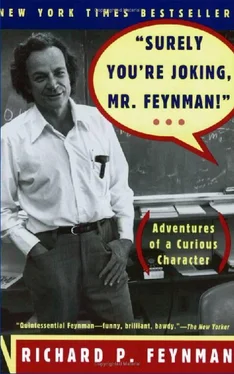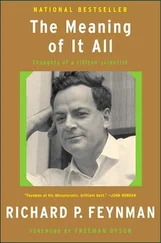So I learned how to look at life in a way that’s different from the way it is where I come from. First, they weren’t in the same hurry that I was. And second, if it’s better for you, never mind! So I gave the lectures in the morning and enjoyed the beach in the afternoon. And had I learned that lesson earlier, I would have learned Portuguese in the first place, instead of Spanish.
I thought at first that I would give my lectures in English, but I noticed something: When the students were explaining something to me in Portuguese, I couldn’t understand it very well, even though I knew a certain amount of Portuguese. It was not exactly clear to me whether they had said “increase,” or “decrease,” or “not increase,” or “not decrease,” or “decrease slowly.” But when they struggled with English, they’d say “ahp” or “doon,” and I knew which way it was, even though the pronunciation was lousy and the grammar was all screwed up. So I realized that if I was going to talk to them and try to teach them, it would be better for me to talk in Portuguese, poor as it was. It would be easier for them to understand.
During that first time in Brazil, which lasted six weeks, I was invited to give a talk at the Brazilian Academy of Sciences about some work in quantum electrodynamics that I had just done. I thought I would give the talk in Portuguese, and two students at the center said they would help me with it. I began by writing out my talk in absolutely lousy Portuguese. I wrote it myself, because if they had written it, there would be too many words I didn’t know and couldn’t pronounce correctly. So I wrote it, and they fixed up all the grammar, fixed up the words and made it nice, but it was still at the level that I could read easily and know more or less what I was saying. They practiced with me to get the pronunciations absolutely right: the “de” should be in between “deh” and “day”—it had to be just so.
I got to the Brazilian Academy of Sciences meeting, and the first speaker, a chemist, got up and gave his talk—in English. Was he trying to be polite, or what? I couldn’t understand what he was saying because his pronunciation was so bad, but maybe everybody else had the same accent so they could understand him; I don’t know. Then the next guy gets up, and gives his talk in English!
When it was my turn, I got up and said, “I’m sorry; I hadn’t realized that the official language of the Brazilian Academy of Sciences was English, and therefore I did not prepare my talk in English. So please excuse me, but I’m going to have to give it in Portuguese.”
So I read the thing, and everybody was very pleased with it.
The next guy to get up said, “Following the example of my colleague from the United States, I also will give my talk in Portuguese.” So, for all I know, I changed the tradition of what language is used in the Brazilian Academy of Sciences.
Some years later, I met a man from Brazil who quoted to me the exact sentences I had used at the beginning of my talk to the Academy. So apparently it made quite an impression on them.
But the language was always difficult for me, and I kept working on it all the time, reading the newspaper, and so on. I kept on giving my lectures in Portuguese—what I call “Feynman’s Portuguese,” which I knew couldn’t be the same as real Portuguese, because I could understand what I was saying, while I couldn’t understand what the people in the street were saying.
Because I liked it so much that first time in Brazil, I went again a year later, this time for ten months. This time I lectured at the University of Rio, which was supposed to pay me, but they never did, so the center kept giving me the money I was supposed to get from the university.
I finally ended up staying in a hotel right on the beach at Copacabana, called the Miramar. For a while I had a room on the thirteenth floor, where I could look out the window at the ocean and watch the girls on the beach.
It turned out that this hotel was the one that the airline pilots and the stewardesses from Pan American Airlines stayed at when they would “lay over”—a term that always bothered me a little bit. Their rooms were always on the fourth floor, and late at night there would often be a certain amount of sheepish sneaking up and down in the elevator.
One time I went away for a few weeks on a trip, and when I came back the manager told me he had to book my room to somebody else, since it was the last available empty room, and that he had moved my stuff to a new room.
It was a room right over the kitchen, that people usually didn’t stay in very long. The manager must have figured that I was the only guy who could see the advantages of that room sufficiently clearly that I would tolerate the smells and not complain. I didn’t complain: It was on the fourth floor, near the stewardesses. It saved a lot of problems.
The people from the airlines were somewhat bored with their lives, strangely enough, and at night they would often go to bars to drink. I liked them all, and in order to be sociable, I would go with them to the bar to have a few drinks, several nights a week.
One day, about 3:30 in the afternoon, I was walking along the sidewalk opposite the beach at Copacabana past a bar. I suddenly got this treMENdous, strong feeling: “That’s just what I want; that’ll fit just right. I’d just love to have a drink right now!”
I started to walk into the bar, and I suddenly thought to myself, “Wait a minute! It’s the middle of the afternoon. There’s nobody here, There’s no social reason to drink. Why do you have such a terribly strong feeling that you have to have a drink?”—and I got scared.
I never drank ever again, since then. I suppose I really wasn’t in any danger, because I found it very easy to stop. But that strong feeling that I didn’t understand frightened me. You see, I get such fun out of thinking that I don’t want to destroy this most pleasant machine that makes life such a big kick. It’s the same reason that, later on, I was reluctant to try experiments with LSD in spite of my curiosity about hallucinations.
Near the end of that year in Brazil I took one of the air hostesses—a very lovely girl with braids—to the museum. As we went through the Egyptian section, I found myself telling her things like, “The wings on the sarcophagus mean such-and-such, and in these vases they used to put the entrails, and around the corner there oughta be a so-and-so …” and I thought to myself, “You know where you learned all that stuff? From Mary Lou”—and I got lonely for her.
I met Mary Lou at Cornell and later, when I came to Pasadena, I found that she had come to Westwood, nearby. I liked her for a while, but we used to argue a bit; finally we decided it was hopeless, and we separated. But after a year of taking out these air hostesses and not really getting anywhere, I was frustrated. So when I was telling this girl all these things, I thought Mary Lou really was quite wonderful, and we shouldn’t have had all those arguments.
I wrote a letter to her and proposed. Somebody who’s wise could have told me that was dangerous: When you’re away and you’ve got nothing but paper, and you’re feeling lonely, you remember all the good things and you can’t remember the reasons you had the arguments. And it didn’t work out. The arguments started again right away, and the marriage lasted for only two years.
There was a man at the U.S. Embassy who knew I liked samba music. I think I told him that when I had been in Brazil the first time, I had heard a samba band practicing in the street, and I wanted to learn more about Brazilian music.
He said a small group, called a regional, practiced at his apartment every week, and I could come over and listen to them play.
Читать дальше












